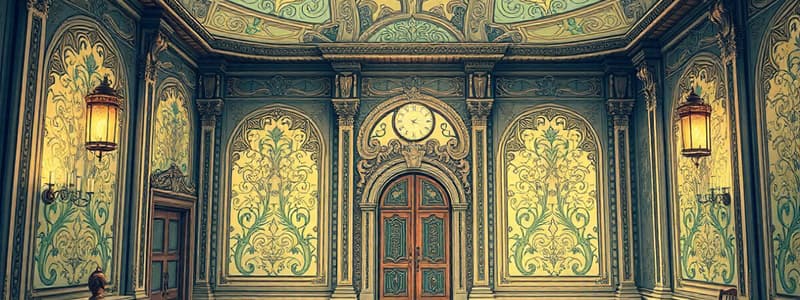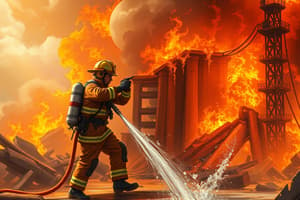Podcast
Questions and Answers
Burning magnesium landing wheels is an example of a Class ______ fire.
Burning magnesium landing wheels is an example of a Class ______ fire.
D
While pier side in CONIS, the material condition generally set is ______.
While pier side in CONIS, the material condition generally set is ______.
YOLK
______ is most effective on Class B fires.
______ is most effective on Class B fires.
PKP
Flammable compressed gases would be classified as a Class ______ fire.
Flammable compressed gases would be classified as a Class ______ fire.
A list of frame numbers that divide the major fire zones can be found in the ______.
A list of frame numbers that divide the major fire zones can be found in the ______.
A burning ______ is an example of a Class A fire.
A burning ______ is an example of a Class A fire.
Piping systems with hand wheels colored dark striped red and dark green carry ______ discharge plugs.
Piping systems with hand wheels colored dark striped red and dark green carry ______ discharge plugs.
Five gallons of ______ of paint is an example of a Class B fire.
Five gallons of ______ of paint is an example of a Class B fire.
When rolled up for storage, the male fitting of a fire hose should be located ______.
When rolled up for storage, the male fitting of a fire hose should be located ______.
An arcing electrical circuit is an example of a Class ______ fire.
An arcing electrical circuit is an example of a Class ______ fire.
The proper process is to remove end from case, insert ______, inhale, escape.
The proper process is to remove end from case, insert ______, inhale, escape.
Soft wedges are removed prior to reinstalling them for final application to ______.
Soft wedges are removed prior to reinstalling them for final application to ______.
A ______ battery is an example of a Class S fire.
A ______ battery is an example of a Class S fire.
A 5-gallon container of AFFF lasts ______ seconds when using the inline educator.
A 5-gallon container of AFFF lasts ______ seconds when using the inline educator.
The first action after reporting a Class C fire is to ______ the power.
The first action after reporting a Class C fire is to ______ the power.
After hot work is complete, a fire watch must wait 30 minutes, and the site must be ______ to the touch.
After hot work is complete, a fire watch must wait 30 minutes, and the site must be ______ to the touch.
PKP extinguishers last for ______ seconds.
PKP extinguishers last for ______ seconds.
The maximum allowable pressure on a new style jubilee patch is ______ PSI.
The maximum allowable pressure on a new style jubilee patch is ______ PSI.
Piping systems with hand wheels colored light purple carry ______.
Piping systems with hand wheels colored light purple carry ______.
The effective range of an AFFF extinguisher is 15 feet and ______.
The effective range of an AFFF extinguisher is 15 feet and ______.
Flashcards
Class D Fire Example
Class D Fire Example
Burning magnesium landing wheels.
Class A Fire Example
Class A Fire Example
Burning mattress.
Class S Fire
Class S Fire
Flammable compressed gases.
Class B Fire Example
Class B Fire Example
Signup and view all the flashcards
Class C Fire Example
Class C Fire Example
Signup and view all the flashcards
Class S Fire Example
Class S Fire Example
Signup and view all the flashcards
First Action for Class C Fire
First Action for Class C Fire
Signup and view all the flashcards
AFFF to Water Mixing Ratio
AFFF to Water Mixing Ratio
Signup and view all the flashcards
Mock Level 4
Mock Level 4
Signup and view all the flashcards
Primary Purpose of P100 Pump
Primary Purpose of P100 Pump
Signup and view all the flashcards
Meaning of Number 3
Meaning of Number 3
Signup and view all the flashcards
Meaning of Number 41
Meaning of Number 41
Signup and view all the flashcards
SCBA Low Air Alarm
SCBA Low Air Alarm
Signup and view all the flashcards
Overhauling a fire
Overhauling a fire
Signup and view all the flashcards
Use of DC Plates
Use of DC Plates
Signup and view all the flashcards
Study Notes
- A 5-pound CO2 cylinder's size determines its ability to activate Halon HFP systems.
- Burning magnesium landing wheels is an example of a Class D fire.
- Material condition YOLK is typically set while pier side in CONUS.
- PKP is most effective on Class B fires.
- Flammable compressed gases are classified as Class S fires.
- Damage control drawings contain a list of frame numbers that divide major fire zones.
- A burning mattress exemplifies a Class A fire.
- Piping systems with dark striped red and dark green hand wheels carry finished foam discharged plugs.
- Five gallons of paint constitutes a Class B fire.
- The male fitting of a stored fire hose should be located inside the roll.
- An arcing electrical circuit is a Class C fire example.
- The proper procedure is to remove the end from the case, insert mouthpiece, inhale, and escape.
- Soft wedges must be removed before reinstalling to reduce fluid flow obstruction.
- A lithium battery exemplifies a Class S fire.
- A 5-gallon container of AFFF lasts 60 seconds with an inline eductor.
- The first action after reporting a Class C fire is to secure the power.
- A fire watch must wait 30 minutes after hot work is complete and the site is cool to the touch.
- PKP extinguishers last for approximately 10-11 seconds.
- The maximum allowable pressure on a new style jubilee patch is 294 PSI.
- Piping systems with light purple hand wheels carry JP5.
- The effective range of an AFFF extinguisher is 15 feet and decreasing.
- The maximum allowable pressure on the old style jubilee patch is 100 PSI.
- Compartment air tested fittings are typically classified as X-ray fittings.
- X40J reels usually have 200 feet of cable.
- First aid personnel can enter a compartment without PPE after a gas-free engineer certifies the area is safe to breathe.
- Shoring battens are NOT stronger than wooden battens.
- The P100 pump is powered by DFM or JP5.
- The top boundary is the most vital fire boundary.
- Three auto-injectors are issued per person at the threat of a chemical attack.
- Air escaping from an air test fitting may indicate flooding.
- The maximum allowable pressure on a soft patch is 150 PSI.
- The mixing ratio of AFFF to water is 6% AFFF to 94% water.
- When applying a soft patch, the rubber gasket should extend 2 inches past the crack or rupture.
- The countermeasure wash system is activated at mock level 4.
- The electrical submersible pump is powered by 400 volt AC.
- The maximum of allowable pressure is 150 PSI
- EWarp should NOT be applied to fuel and potable water
- Black non collapsible hose is used
- Practical damage control information is in 079 Volume 2.
- The primary and secondary purposes of the P100 pump are firefighting and dewatering.
- The number 3 in a compartment number indicates the compartment is on the 3rd deck.
- Sizes include 2 and a half inch and 4 inches.
- Inventory the kit and then inform the locker leader.
- The maximum allowable pressure on EWarp is 150 PSI.
- K-type shoring is NOT the strongest configuration of shoring.
- An ESP pump with a 50-foot discharge head pumps approximately 200 gallons per minute.
- If shoring is in place, a shoring watch must be provided.
- Look for the longest answer when trying to gain suction once the P100 is started
- After inventorying a DC kit,
- The number 41 in a compartment number indicates the forward most frame in the compartment.
- 20 seconds soak time and 30 minute cure time is important
- SCBA cylinders should be charged to at least 4000 PSI.
- CO2 should be applied to a fire at a distance not greater than 426 feet.
- Check for flooding in air/water tight compartments by tapping corner to corner.
- The maximum length for a 2x2 wedge is 6x the minimum butt thickness.
- The SCBA alarm will provide an auto warning at 25%
- bulkheads, decks and overheads closest to surrounding the fire
- Prioritize all holes at or below the waterline for battle damage.
- Tapping on a bulkhead with a metallic object is a good way to check for flooding.
- Overhauling a fire generally means breaking up all residual materials.
- The three pieces of information next to a DC fitting on a compartment check-off list are the compartment name, the division responsible for the fitting, and the classification.
- Submersible pumps are not designed for gasolines or heavy oils.
- The two sizes of metal shoring utilized on navy ships are three to five feet and six to eleven feet.
- MA paper turns YELLOW when exposed to G-series nerve agents.
- S-type and perry jet are two types of portable educators
- water tight and air tight boundaries.
- Laminated copies of ships diagrams/ DC plates are used to chart the status
- The number 2 in a bullseye indicates the compartment is on a certain deck
- WILLIAM fittings are not closed when general quarters are sounding
Studying That Suits You
Use AI to generate personalized quizzes and flashcards to suit your learning preferences.




